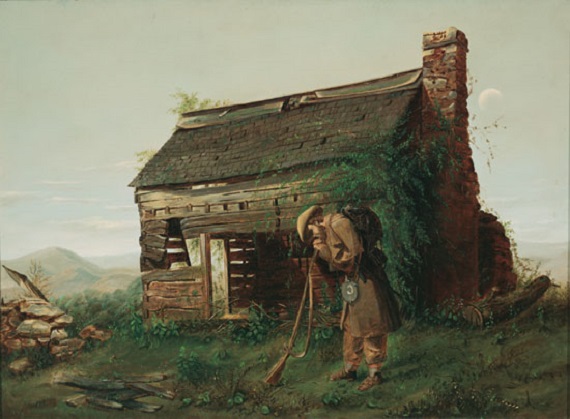
Americans have a weird relationship with their roots. Most folk want to be from somewhere, but they often don’t want to be in that somewhere. As someone who has unusually old roots in Northern Virginia — perhaps one of the most transient parts of the country — I think I might witness this more than most.
Few people who live in Northern Virginia want to stay here — they come for the jobs, do their 20 or 30 years of federal service, and then depart for greener (or, more typically, sandier) pastures. They proudly flaunt paraphernalia from their home state on their vehicles and place little garden flags from their alma maters in their front yards. They complain about how terrible Northern Virginia is — the cost of living, the traffic, its transient nature (they often fail to see the irony of that last one) — and brag about their home states. Californians are insufferable with this.
Of course, I also get it. Job opportunities in much of America are limited. People get wanderlust and want to experience something different. And then, after a honeymoon period in a new place, they grasp how much they miss their home state or town. Sometimes the nostalgia gets saccharine and absurd — a lot of people in Northern Virginia with no agricultural background talk about wanting to farm, largely oblivious to its realities (my 98-year-old grandmother escaped an impoverished Kansas farm hit by the Dust Bowl, so my views are a bit less romantic).
The tension seems so deeply embedded in the human condition, I’m not sure we could ever get rid of it. We know that place grounds and defines us, but we grow tired of it and need to explore, to feel the exotic. Then, as we grow older and disenchanted with the dissatisfying incomplete salvific qualities of the novel, the old place calls to us, and we realize, perhaps a bit like the prodigal son, that our departure was in some senses an insult to our patrimony and inheritance. We yearn to rush back, hopeful that it will be the same… though usually it’s not.
Southern music, and certainly country and bluegrass, understands this tension. Sometimes it is presented in a playful manner. Hank Wiliams in his “Honky Tonk Blues” leaves his home out on the rural route, telling his paw he’s “goin’ steppin’ out.” Though he yearned for dancing and thrills, soon enough the city life loses its luster and leaves him down. Thus he sings:
I’m gonna tuck my worries underneath my arm
And scat right back to my pappy’s farm
And leave these honky tonk blues
Yeah, the honky tonk blues
Well, Lord I got ’em
I got the ho-on-ky tonk blues
Of course Williams’ tale is intended to be lighthearted. But it also communicates a deeper truth: the appeal of the unknown and glamorous is often unfulfilling. We think a change of scenery, a faster pace of life will solve all of our problems. It only temporarily obscures them. More than not, it eventually compounds those problems, and deepens our sense of isolation. So we head home, perhaps with eyes downcast, admitting to our kith and kin that we were foolish to go.
But will home be the same? In “The Old Home Place” by The Dillards (though my favorite version is that sung by Ricky Scaggs) tells the story of a young man who left his holler to work in a sawmill in Charlottesville (not exactly a metropolis, but this is the South, after all). Yet while he’s gone, his sweetheart runs off with another man, and he wastes all his money in the taverns. When he finally goes back, even his old home lies in ruins. Thus he ends:
Now the geese they fly south and the cold wind blows
As I stand here and hang my head
I’ve lost my love I’ve lost my home
And now I wish that I was dead
The longer we tarry, the more likely it is that home will no longer be recognizable to us.
Similarly, in “My Destination” by The Infamous Strindusters, a country boy leaves his town and his girl “to see what I can find.” He keeps an old love letter and wonders when he returns “will you be there to take me by the hand?” After ten years he returns, and he thinks he sees his old flame, only to realize “it was just an illusion.” As the train departs, he hands his head and cries.
And of course, who could forget Ralph Stanley’s “Man of Constant Sorrow,” popularized by the 2000 movie “O Brother, Where Art Thou?” In this unusually catchy ditty for such depressing lyrics, a man leaves his home in Kentucky, loses his friends and his lover, and fears being buried in some distant, desolate valley. His only hope is in the promise that he might meet his love again on “God’s golden shore.”
Perhaps part of the answer to the dilemma of home and away is found in that last line. Often we are unsettled in our hearts because we confuse the exotic destination for the divine. Our hearts were made for heaven, and we think we will be satisfied with New York, San Francisco, or wherever our culture’s elites tell us is the new trendy place. The very fact that these cities keep changing — who would have thought Boise, Idaho would ever make the list? — is suggestive that such locations are indeed fleeting and ephemeral in what they can offer our souls.
In theology, there is a concept called the exitus et reditus, or the exit and return. In the most perfect sense, this is represented by Christ Himself, who leaves the Trinity, incarnates in order to save fallen humanity, and then through His resurrection and ascension, returns to the Father. But all of us who are Christians in a sense are called to this journey. We go out into the world, seek to fulfill our callings, and return to our Father through prayer and communion. Yet that we return signifies that home is not only our origin but also our destination.
And in many cases we can participate in that exitus et reditus in our own communities. Indeed, staying home requires a very different kind of hard work. Certainly going somewhere new presents its challenges, but so does staying. People know us and our limitations. They know our families, our histories, and our failures. By leaving, we can leverage the shield of anonymity. By staying, we lock ourselves into an identity that can be difficult to discard.
Yet by staying (or returning) to our homes, we participate in a noble, if underappreciated enterprise. Our presence in our native communities helps to preserve their conservation in a manner similar to how Edmund Burke describes conservatism — a slower, steadier, more organic type of progress that is more befitting human nature and society. When communities (like mine in Northern Virginia) suffer from constant turnover, that local identity crumbles and “progress” accelerates at a rapid clip.
One need look no further than Fairfax County’s decision to rename all manners of streets, schools, and communities that are now perceived to be racist or patriarchal. Is anyone surprised, given how many transplants live in Northern Virginia, who could care less about local heroes like John Singleton Mosby, the Gray Ghost? Sometimes the exitus can simply be leaving the comforts of one’s own home and fighting for one’s community in that very community.
Naturally we can romanticize our homes in unhelpful ways as well. Insular communities, though more effectively preserving their subculture, can be oppressive and inimical to human flourishing. In an attempt to protect themselves from outside influences, such communities can slowly deteriorate as their fear of change immobilizes and even emasculates them. All of us require challenges to keep our souls and minds sharp.
That said, it seems pretty obvious in our time of globalist consumerism, technological innovation, and ideological progressivism, that change and disruption are happening so quickly that they are vitiating human happiness and flourishing. We can see it in skyrocketing rates of depression, loneliness, addictions, and substance abuse. We yearn for something tangible to hold onto, and iPhones, Amazon, and exotic cuisine options are simply not up to the task.
What we yearn for is home. Certainly our spiritual, eternal home, as Ralph Stanley and many other country and bluegrass singers would tell us. But also a home that we know, that is familiar to us, and reminds us of who we are and where we came from. A home that tells us to stop trying to reinvent ourselves, and accept who we are in all of our finitude and imperfection. Wherever we were born, raised, schooled, the places have left an indelible imprint, even in this impermanent twenty-first century America.
As my friend Emile Doak at The American Conservative has recently urged, if we are financially and professionally able, we should consider staying home. Or return home, as the case may be. Before it is too late and our homes of distant, nostalgic memories are gone forever. Home may not be perfect, but it can be something stable and secure in this time of socio-political distemper. Perhaps, unlike the vocalist of the Infamous Stringdusters, we may even find love. As The Stanley Brothers sing in “How Mountain Girls Can Love”:
Get down boys, go back home
Back to the girl you love
Treat her right, never wrong
How mountain girls can love






A lesson that so many in today’s world never learn.
Society as a whole today, seems to not have roots, or if they do, they seem to want to deny their origins or their roots, or those denizens of the left want to force those of us that are of our southern heritage, or our Scots-Irish ancestors, to repent of our pride or our manners and even our manner of speaking or the words that we use to express emotions and our attitudes of life and the God that we believe is Supreme, vs their belief in a supreme federal oligarchy to dictate our every move and thought and words.
I, for one, cannot and will not, deny my roots, my ancestors, my people or my God.
I will be buried in the ground where I was raised, and where my children and, wife and loved ones that have gone on reside.
This is so good! I have been thinking a lot about this tug of war and I love his conclusions.